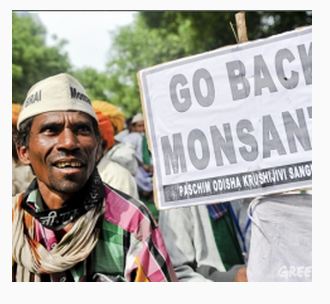Indian public researchers have been deploying investments in genetic engineering of crops over the last 15 years. Beyond countries in the Americas and Northern Europe, Indian public research has the largest number of scientists who are well trained in crop improvement, safety assessment and deployment in farmer fields.
The Indian private sector has demonstrated that these crop improvement efforts can be affordable, scientific and regulatory compliant in accordance with the best regulatory protocols adopted across the world. This was an unprecedented national effort. The use of Bt-cotton in India has grown exponentially since its introduction for than a decade ago, leapfrogging India from a laggard to a world leader. India recently became the number one global exporter of cotton and the second largest cotton producer in the world.
India has also shown the way for public private partnership with some of the discovered genes licensed by Indian research bodies to Indian private sector to develop vegetable and grain crops. The private sector, mirroring the success in drug and pharmaceutical developments, is generating affordable technologies for smart crop improvement and bringing these traits to the farmers on their own or in partnership with global entities, thereby providing affordable seeds not only to India but also to other developing countries.
Indian cottonseeds go far and wide. We see them grown in South Asia and South East Asian countries (such as Burma) although these countries have not officially approved these products. The fact is that proven technology, even when not officially approved, are embraced by needy farmers for their own survival and attempts to block their acceptance will only result in their uncontrolled, illegal adoption to the detriment of the nation. This is what is happening today in China, where the Bt rice is widely adopted but the government is in a denial mode due to protests and an uncertain policy framework.
India becoming center of anti GM movement
The dramatic success of GM crops has spawned a counter reaction. The efforts of foreign funded non government organizations (NGOs) to create obstacles for Indian public research organizations and the Indian private sector commenced about 14 years ago when Bt cotton was still under regulatory validation. During the last 8 years, several Indian public sector research organizations, indigenous industry players and joint ventures with majority Indian holding have developed a number of biotechnology derived seeds that can bring enormous advantage to Indian agriculture, specifically to small and marginal farmers and consumers. But the effort is threatened by vigorous efforts of a handful of powerful, heavily funded NGOs, which are based in Western developed countries. Anti-GMO activist organizations that appear to be indigenous are heavily funded by western advocacy groups.
Over the last five years, anti-GMO efforts have escalated to back the introduction Bt brinjal (eggplant) by the three leading public research organizations (Indian Council of Agriculture Research, Tamilnadu Agriculture University and the University of Agriculture Sciences, Dharwad) teaming with the Indian company Mahyco seeds (Monsanto has a minority interest) in partnership with Indian public research organizations (IARI, the Indian Agriculture Research Institute, developed Bt brinjal, Bt okra, disease tolerant potato, drought tolerant rice and other crops). Anti technology NGOs have attracted millions of dollars of funding from western sources to engage in destructive attacks on the public and private entities:
- Pursuing propaganda against the GM crops with international coverage on major television networks to develop a series designed to attract money from European activists. That lead to propaganda coverage in Al Jazeera, French TV and other channels and across the world.
- Others have engaged nationwide with a series of television news stories featuring non-farm activists in the guise of farmers (most of these converge never attracted the true farmers and their true associations), bringing them to urban centers to agitate and even mobilizing school children to agitate against GM crops.
- Filing of “public interest” litigation in the Supreme Court over the last 12 years, Anti-GM groups have hired expensive lawyers to mobilize against the government departments regulating GM crops. The cost of the public interest litigation has amounted to several millions of dollars.
- Mobilization of more than 8000 people to protest against the approval of Bt brinjal as the Minister for Environment was debating its regulatory fate. The protests succeeded in marginalizing the voices of scientists who dared to speak up in favor of science. All the education materials placed by scientists were promptly destroyed by the outside protestors, many of whom were recruited and paid to demonstrate.
- Sending anti-GMO “hit squads” from India, supported by international NGOs , to other countries such as Philippines that are on the verge of introducing the Bt brinjal. Some of the Indians trespassed the in fields to destroy GM crops, and these Indians were deported by the Philippines government for trespassing. The legal proceedings are currently ongoing in Philippines courts. One of the scientists from Indian public research institution was flown to the Philippines to testify on behalf of activists.
- Thousands of campaigns have been rolled out in villages across the country, including puppet shows to disseminate false information and create a sense about the alleged “dangers” of GM crops.
- Protesters trespassed at trial sites at Tamilnadu Agriculture University and other locations, obstructing the public research activity.
- Most NGOs argued that GMOs were destroying biodiversity yet they exported rare Indian plants and conserved seeds to European entities without any concern for biodiversity violations. In fact, university-based development of GM seeds ensures their continued adoption by resource poor farmer. This is the only way to preserve biodiversity and ensure that these varieties remain popular.
The escalating protests over the last five years have turned the Indian clock in agriculture research back by more than a decade. The issue is compounded by India’s shoddy and politicized regulatory system. This professional science rejectionist movement can only be overcome with smart articulation of facts to the public by scientists. In countries that have embraced science, innovations have catalyzed the people and brought huge benefits.
Vijay K. Vijayaraghavan is an Indian Regional Coordinator for Cornell University and a Visiting Fellow, Cornell University College of Agriculture and Life Sciences International Programs (IP/CALS),ALS) and Chairman, Sathguru Consulting.
Source: Genetic literacy


